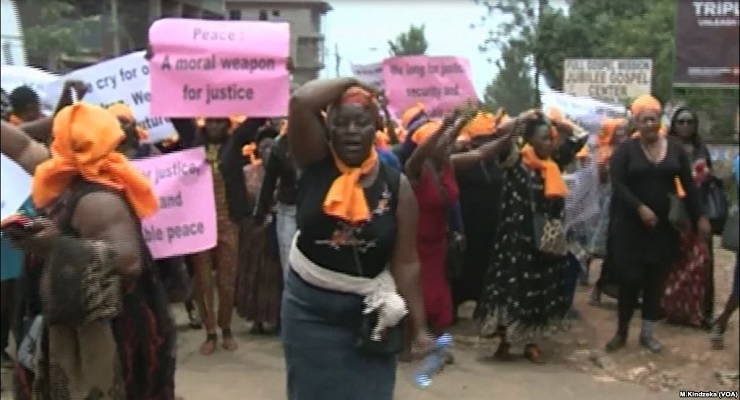
From Voice Of America
Cameroonian Prime Minister Joseph Dion Ngute visited the crisis-prone English-speaking region Friday, prompting protests from 200 women who demanded an end to the violence there.
Clotilda Wah, spokesperson for the Northwest and Southwest Women’s Task Force, says the group can no longer bear the killing, destruction of property, looting and kidnapping.
“As women, we bear the brunt,” she said. “We, as women, have been burying our children, burying our husbands. If a military man is killed, he is a woman’s husband. If an Amba [separatist fighter] boy is killed, he is a woman’s son. So we are coming out as mothers to cry for peace and nothing but peace.”
The women were pushing the government to organize an all-inclusive dialogue among separatists, the civil society and disgruntled Cameroonians, according to Wah.
The military said fighting had intensified in at least 13 English-speaking towns, including the northwestern towns of Kumbo, Ndop, Bafut and Kom and the southwestern towns of Kumba, Mamfe and Mutengene, with at least 18 people killed in the past five days.
Separatists had told Cameroon’s prime minister not to visit their territory, and promised hard times if residents showed up to see him.
Bamenda resident Francis Nkwelle said he was willing to face the threats to tell the prime minister he supports having an all-inclusive dialogue to solve the crisis.
“Look for a way for us to dialogue,” Nkwelle said. “There is nothing which is above dialogue. The key to every problem is dialogue.”
Biya declared war on the separatists in November 2017, saying that it was his duty to ensure public order, social peace, the unity of the nation and Cameroon’s integrity.
Ngute said Biya sent him to Bameda to tell English speakers that the government is open to dialogue, but that separatists will not be listened to because Cameroon is one nation and indivisible.
“He is prepared to hold that dialogue,” Ngute said. “All he is looking for is people who can be representative enough to dialogue, and he has said that with the exception of separation or secession, every other topic can be discussed.”
Cameroon’s unrest began in 2016 when English-speaking teachers and lawyers demonstrated against the growing dominance of French in the officially bilingual country. The government responded with a crackdown and separatists began using weapons against the military, alleging that they were defending their people and fighting for their independence.
U.N. visit
Last week, U.N. High Commissioner for Human Rights Michelle Bachelet visited Cameroon and blamed security forces for extrajudicial killings, and the torturing of civilians and captured fighters. She asked for an inclusive dialogue to be organized.
The high commissioner condemned the targeting of civilians by all armed groups, as well as the torching of schools and medical facilities by separatist groups.
Leave a Reply